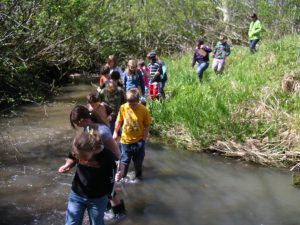2024 Geography Education Grant Program Update
We will not be offering a formal competitive grant cycle for Geography Education funding in 2024. We are excited about several projects we will be supporting for the next several years and are planning to use those programs and our amazing Geography Education Advisory Committee to help inform the next phase of this grant program. If you are an educator looking for support for a geography education related project, we also encourage you to check out the grant and professional development opportunities with the Center for Geography Education at Portland State University. We will plan to launch a new competitive opportunity in 2025.
If you have an off cycle project or organization we should be aware of, please don’t hesitate to reach out to our Program Officer, Nell Tessman, at ntessman@grayff.org.
Geography Education Grant Program
The goal of Gray Family Foundation’s Geography Education is to foster a sense of place for children, youth, and educators in their local and global community. Through our grant program, we hope to prepare students to be active stewards of Oregon’s communities and natural environments.
Gray Family Foundation, through our Geography Education Program, will award grants to projects that align with our priority objectives:
- Improve students’ practice of geography skills, tools, and perspectives;
- Support interdisciplinary instruction of Geography as a foundation for instruction of other subjects;
- Increase student participation in geography learning experiences, with a focus on those that reflect all voices and cultures impacted by Oregon’s geography.
2022 Grant Opportunity – Geography Education Innovation Grants
Students, educators, and families across Oregon continue to be faced with a myriad of challenges resulting from the COVID-19 pandemic and wildfires. Recognizing and honoring the significant ways community-based organizations, schools, and educators have been innovating to help students understand and navigate this complicated time, Gray Family Foundation is offering grants to support organizations, schools, and educators in the development or implementation of instructional resources, projects, and programs that use the power of geography to help students explore and understand the challenges facing our local communities.
In 2022, we have $200,000 in new funding available to support organization and educator grants. We anticipate awarding up to six organization grants of $25,000 each as well as 5-7 educator grants of approximately $5,000. Both types of projects should primarily serve/benefit Oregon students and use the power of geography to help students explore and understand challenges facing our local communities.
To learn more about our previous grant cycles:
- Download our 2022 Geography Education RFP.
- Check out the sample budget template here (please note that you are welcome to use your own).
- For educators only – check out a sample successful educator grant application here. Please note that this is an example from a previous year and guidelines have shifted in 2022 but this offers AN EXAMPLE of information to include in an application.
- Reach out to our Program Officer, Nell Tessman, at ntessman@grayff.org or 503-552-3511 with any questions.
Gray Family Foundation Geography Education Program
As a result of funding Geography Education in Oregon, it is our hope that Geography Education can become a more meaningful part of the Oregon K-12 experience. We will observe more active stewardship of our natural and built communities and nurture Oregonians that are prepared to assume responsibility and make critical local and global decisions. These efforts will help create the conditions for strong Oregon communities, culture, economy, and environment.
Geography is…
Geography is the study of patterns, processes and connections that shape our world—the links between environment, people and culture. It is a way of understanding the differences and similarities between people, and how the places we live shape the people we are—and vice versa. Geography isn’t a discrete subject. It is a nexus between many subjects and disciplines. Being geography literate means being an empowered citizen. It unlocks doors to experiencing the world more richly and more knowingly.
Geography Education is…
Geography education must work to help each student approach the world from spatial and ecological perspectives; acquire knowledge and understanding about the world in spatial terms and about the physical and human systems represented in regions; and develop the skills necessary to apply geographic thinking.
Geography Education Considers…
Geography education must consider all aspects of place—natural, built, technological, and social (economic, political, cultural, historical, and aesthetic)—and acknowledge their interdependence, emphasizing the linking of civic engagement today with consequences for tomorrow.
In order to accomplish this, geography education should be continuous through the K-12 experience, be taught in tandem with, or integrated into, other subjects and offer students direct experiences beyond the classroom with local, regional, and global places.
Geographically Literate Students are…
Geography education must help students develop a command of geographic tools and perspectives—a sense of place in their local and global community—which prepares them to engage in a way that sustains Oregon’s natural and built communities.
